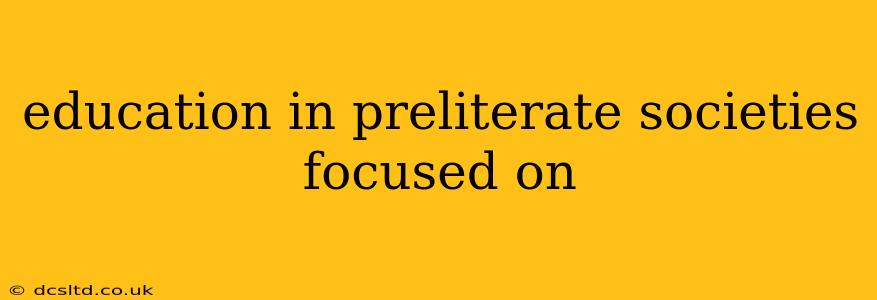Preliterate societies, those lacking a written system, developed sophisticated methods of education deeply intertwined with their daily lives and cultural survival. Unlike formal schooling in literate societies, education in these communities was largely informal, experiential, and focused on transmitting vital practical skills and cultural knowledge across generations. This approach ensured the continuity of traditions, social structures, and the very survival of the group.
What were the main methods of education in preliterate societies?
Education in preliterate societies wasn't confined to a classroom; it was a continuous process integrated into the fabric of daily life. Learning happened through observation, imitation, participation, and storytelling. Children learned by watching adults perform tasks, mimicking their actions, and gradually taking on more responsibility. This apprenticeship-style learning was crucial for mastering essential skills.
What skills were emphasized in preliterate societies' education?
The skills emphasized directly reflected the needs of the specific society and its environment. Common areas of focus included:
-
Practical Skills: Hunting, fishing, farming, crafting tools, building shelters, and preparing food were all vital skills taught through hands-on experience. The specifics varied widely based on the society’s lifestyle – pastoralist communities emphasized animal husbandry, while agricultural societies focused on farming techniques.
-
Social Skills: Understanding social roles, customs, traditions, and the complexities of social interactions were essential for community cohesion. These were learned through participation in ceremonies, rituals, games, and daily social interactions.
-
Spiritual and Religious Knowledge: Belief systems, rituals, and myths were fundamental aspects of preliterate societies. These were passed down through storytelling, ceremonies, and initiation rites, often involving elders or spiritual leaders acting as mentors.
How was knowledge transmitted in preliterate societies?
The transmission of knowledge was multifaceted and often embedded within cultural practices:
-
Storytelling: Narratives, myths, legends, and folktales were powerful tools for transmitting values, beliefs, historical accounts, and practical knowledge. They served as both entertainment and educational resources.
-
Oral Tradition: The absence of writing meant that knowledge was meticulously preserved and passed down through generations through oral traditions. This relied heavily on memorization, repetition, and skilled storytelling.
-
Apprenticeships: Children and young adults learned by working alongside experienced adults, gradually mastering skills through direct observation and practice. This hands-on approach ensured practical competence.
-
Rituals and Ceremonies: Rituals and ceremonies were often vehicles for passing on important cultural knowledge, social norms, and spiritual beliefs. Participation was crucial to learning and maintaining cultural continuity.
What role did elders and community members play in education?
Elders and other community members played a vital role as educators and mentors. Their accumulated wisdom and experience were invaluable sources of knowledge. The community as a whole was actively involved in educating its younger members.
Did preliterate societies have any formal education structures?
While formal schooling in the modern sense didn't exist, some societies did have structured initiation rites or apprenticeships that involved periods of specialized training. These served as formalized pathways to adulthood and mastery of specific skills or roles within the community. However, even these structures were integrated into the broader cultural context and often involved a combination of formal and informal learning.
How did preliterate education differ from modern education systems?
The fundamental difference lies in the informal and experiential nature of preliterate education compared to the structured, formalized systems prevalent in modern societies. Preliterate education emphasized practical skills and cultural transmission through direct participation, observation, and oral tradition, while modern systems increasingly focus on abstract concepts and standardized testing. However, the underlying goal remains the same: to equip individuals with the knowledge and skills necessary to thrive within their society. Recognizing the strengths of preliterate educational approaches can enrich modern educational philosophies and practices.
